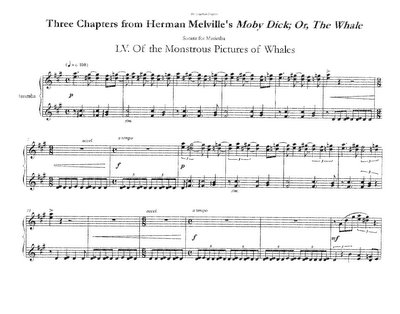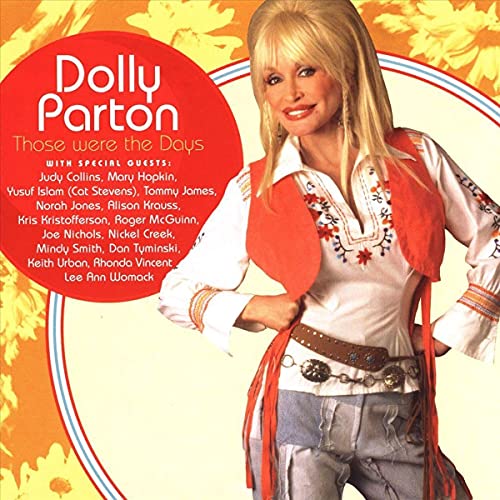 I have recently completed a three-movement sonata for solo marimba entitled “Three Chapters from Herman Melville’s Moby Dick; Or, The Whale”, which was composed at the behest of Mr Jonathan Shapiro. It was conceived whilst on the California Zephyr train, slowly descending out of the Rocky Mountains along the Colorado river, earlier this month. In the beginning of January, I sat awake for twenty-two of the twenty-five non-stop hours of the annual Moby Dick reading at the whaling museum in New Bedford, Massachusetts, so located because that’s where the book begins (except it actually begins penniless in a noisy New York City). Hearing this bizarre book out loud, without a pause, with over a hundred readers ranging from the eloquent to the stuttering, whale bones hanging abovehead, was quite an experience. As any familiar to the book will know, after about a hundred pages (four hours), & the ambiguous narrator is aboard the Pequod, the plot simultaneously heightens & disintegrates. There are long rambling chapters about the grace of whaling, the majesty of whales, written in a parodic sublime, which is both tongue-in-cheek & massive – I mean, both ironic & not – I mean, both a joking pseudo-academic blabber, & language with a Shakespearean grandeur & Miltonic range of allusion.
I have recently completed a three-movement sonata for solo marimba entitled “Three Chapters from Herman Melville’s Moby Dick; Or, The Whale”, which was composed at the behest of Mr Jonathan Shapiro. It was conceived whilst on the California Zephyr train, slowly descending out of the Rocky Mountains along the Colorado river, earlier this month. In the beginning of January, I sat awake for twenty-two of the twenty-five non-stop hours of the annual Moby Dick reading at the whaling museum in New Bedford, Massachusetts, so located because that’s where the book begins (except it actually begins penniless in a noisy New York City). Hearing this bizarre book out loud, without a pause, with over a hundred readers ranging from the eloquent to the stuttering, whale bones hanging abovehead, was quite an experience. As any familiar to the book will know, after about a hundred pages (four hours), & the ambiguous narrator is aboard the Pequod, the plot simultaneously heightens & disintegrates. There are long rambling chapters about the grace of whaling, the majesty of whales, written in a parodic sublime, which is both tongue-in-cheek & massive – I mean, both ironic & not – I mean, both a joking pseudo-academic blabber, & language with a Shakespearean grandeur & Miltonic range of allusion.I think the three chapters about images of whales – chapters LV thru LVII – come at a pivitol point in this narrative disintegration. Melville has completely outlined the basic dramatic structure, & ruminated on the deepest mysteries inherent in the boredom of a three-year voyage, & now that that boredom has set in, eleven hours into a non-stop reading, he wields his long sentences to attack all those who can’t illustrate a whale correctly, the dorsal fin is in the wrong place, &c. I can’t help pitying those who are forced to read this in high school, weary after hours of algebra, physics, & whatever-else homework, & Melville is still ambling on about bones. I cannot imagine very few readers approaching these chapters with a proper mind to appreciate them. But when you come at them with a maturity, a postmodern distance, & perhaps that majestic tedium that being on a changeless ocean, or a train, or lying awake in a whaling museum non-stop on a cold tile floor, I think these chapters are really fucking funny.
But the placing of the cap-sheaf to all this blundering business was reserved for the scientific Frederick Cuvier, brother to the famous Baron. In, he published a Natural History of Whales,
 in which he gives what he calls a picture of the Sperm Whale. Before showing that picture to any Nantucketer, you had best provide for your summary retreat from Nantucket. In a word, Frederick Cuvier's Sperm Whale is not a Sperm Whale, but a squash. Of course, he never had the benefit of a whaling voyage (such men seldom have), but whence he derived that picture, who can tell? Perhaps he got it as his scientific predecessor in the same field, Desmarest, got one of his authentic abortions; that is, from a Chinese drawing. And what sort of lively lads with the pencil those Chinese are, many queer cups and saucers inform us.
in which he gives what he calls a picture of the Sperm Whale. Before showing that picture to any Nantucketer, you had best provide for your summary retreat from Nantucket. In a word, Frederick Cuvier's Sperm Whale is not a Sperm Whale, but a squash. Of course, he never had the benefit of a whaling voyage (such men seldom have), but whence he derived that picture, who can tell? Perhaps he got it as his scientific predecessor in the same field, Desmarest, got one of his authentic abortions; that is, from a Chinese drawing. And what sort of lively lads with the pencil those Chinese are, many queer cups and saucers inform us.-ch. LV, “Of the Mountrous Pictures of Whales”
On the train, with the cud-chewing & gentle rocking thru the Rockies, I thought of the post-Minimalist music I’ve been writing, inspired by the Bang-on-a-Canners, New York hipsters, a lot of it (both their’s & mine) quite boring, indifferently, with a lot of imprecise repetitions, a consistent texture, with the whole of notated Western music (along with popular & world musics) to draw from in reference, often ironically & in dense combination, but the pretension fully cohesive, destined to promote eye-rollings if the audience can actually pay attention. Well, at least the loose rhythms, (a lot of vague 2s & 3s to create a rhythmless, improvisatory atmosphere, like in David Lang’s Little Eye), feel somewhat aquatic, rocking, like a road-trip movie. The modernists found Melville relevant, & fully revived him in the ’20s, & there he’s sat at both the foundation & margins of American art; & then the postmodernists re-found him, & I’m sure I’m not the first to find a relation between the marginalized 21st-century hipster-ass classical music (which is a sort of genre-less post-postmodernism, often self-aware at its own self-awareness), & the deepest ambiguities in Melville’s narrative voice. I gave my piece a dose of the Americana harmonies, reminiscent of Copland & Ives, kept the rhythms in those swaying 2s & 3s of David Lang, but the voice is Melville’s.
 1) Charlotte Perkins Gilman
1) Charlotte Perkins Gilman 












